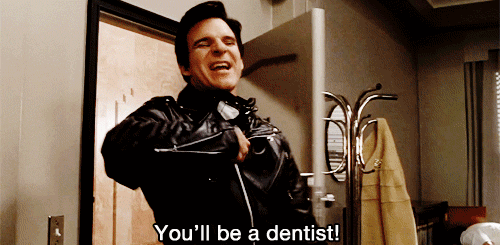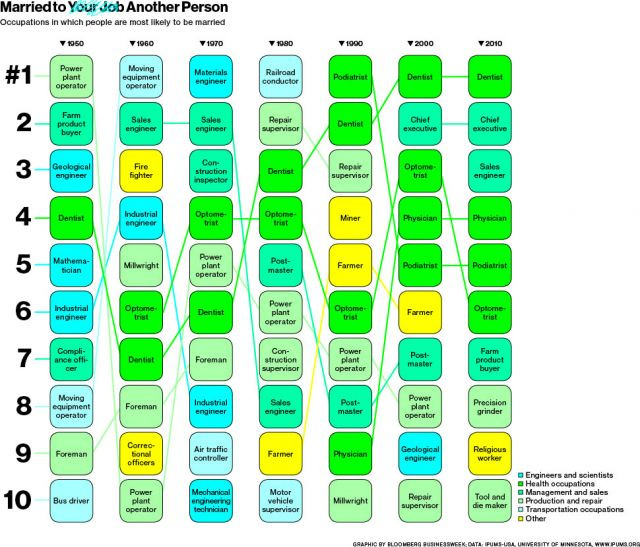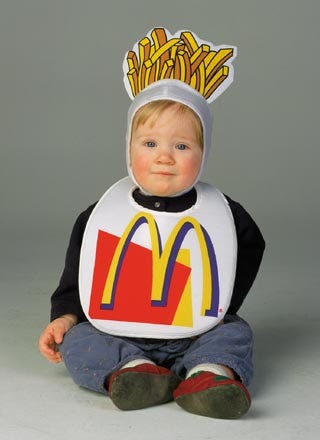So What, Who Cares (vol 2, issue 3) Why you're unlikely to date your dentist
Hello! You will all be amused to know that January 8th is National Bubble Bath Day, so it's time to start writing very serious memos about how this needs to be a paid holiday. Lobby your congressperson to add a rider to the next budget bill demanding U.S. government subsidies for Lush bubble bars. That's totally reasonable, right?
*

If you want to be happily married, be a dentist. Businessweek has a fascinating pair of infographics that manage to list the occupations with the highest and lowest divorce rates, and they track the changes of those professions from 1950 to 2010. The dental profession has quietly dominated rankings of most-married professions for all seven decades; what's fascinating is how, over the decades, the highest-marital-rate occupations have skewed more white-collar while the highest divorce-rate professions have moved from an arty/alternative bunch to a very blue-collar workforce.

So what? On first glance, the charts are visual evidence of the class/marriage gap (vol 1, issue 33) that has captured the attention of so many social scientists.
As one put it, "The marriage gap is widest when economic inequality is greatest," and others are noting that the resultant social and economic inequality is hampering the mobility of today's children. Still more social scientists have noted that professional-class women tend to marry later, have higher marriage rates (per their cohort) and lower rates of divorce. (See a pretty chart backing that up here.)
Who cares? Anyone who is tracking the use of marriage statistics as a tool for shaping policy in U.S. lawmaking.
The state of marriage statistics in the U.S. is surprisingly complicated. For example, marriage and divorce are supposed to be collected by states and reported nationally by the National Center for Health Statistics, but several states -- including California, Georgia, Hawaii, Indiana and Lousiana -- don't collect those stats. There's no federal funding for them to do so. Moreover, the Census Bureau recently proposed ditching three questions about marriage and divorce history, which would further narrow the amount of available demographic data about U.S. marriage rates. The remaining body collecting data about marriage in the U.S. is the Current Population Survey (CPS), but they only study 99,000 U.S. households and there's no way to extract local data.
So long as marriage rates are used as justification for pushing specific social policies, it's in everyone's best interests to know exactly what data is being collected and what its limitations are.
*

It may be time to grade on a french fry-shaped curve: A study published in Clinical Pediatrics found that eighth graders who ate fast food regularly (think daily) were statistically behind their peers in tests measuring reading, math and science. The report says: "The link between fast-food eating and academic performance remained intact even when such variables as physical activity, television watching and socioeconomic status were included."
So what? This is a study to find a direct link between fast food and brainpower for the kids. You can whip that out the next time the kids want to hit the Golden Arches two nights in a row.
Who cares? A third of U.S. children are consuming fast food in any given day in America, and the older the child, the more frequently they're hitting fast food outlets, with teenagers having fast food about twice a week. Fast food is a staple of most families' diets in the U.S. But locales that are super-conscious of school test scores can now lobby against new fast food outlets, citing the link between academic performance and value meals.
*

Your pop culture note of the day: This Saturday at 8 p.m. PST/11 p.m. EST, The Incomparable is reviving our Comic Book Club and this month's pick is Alan Moore's Promethea. We'll be covering volumes 1 and 2. I'd love to include you all in this somehow.
Maybe ... email or tweet your questions and comments any time between now and the podcast? Follow @theincomparable on Twitter for the link to the live podcast recording -- and you can ping me with questions live during Comic Book Club too.
Anyway, I'm super-excited to talk about a comic series that I think would make an amazing (if slightly insane) TV miniseries (vol 1, issue 41) -- a TV miniseries on a network that is totally down with a lengthy subplot dedicated to teaching magic via tantric goings-on, that is. I'd love to have you join me.
*
Did you miss an issue of So What, Who Cares? The archive is here. Are there typos? I apologize in advance.
As always, I welcome your feedback and suggestions via email or Twitter. Always let me know what you think about So What, Who Cares? If you really like it, tell a friend to subscribe.

